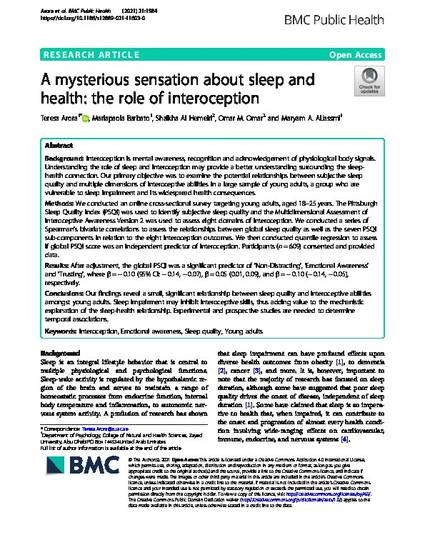
BACKGROUND: Interoception is mental awareness, recognition and acknowledgement of physiological body signals. Understanding the role of sleep and interoception may provide a better understanding surrounding the sleep-health connection. Our primary objective was to examine the potential relationships between subjective sleep quality and multiple dimensions of interoceptive abilities in a large sample of young adults, a group who are vulnerable to sleep impairment and its widespread health consequences. METHODS: We conducted an online cross-sectional survey targeting young adults, aged 18-25 years. The Pittsburgh Sleep Quality Index (PSQI) was used to identify subjective sleep quality and the Multidimensional Assessment of Interoceptive Awareness Version 2 was used to assess eight domains of interoception. We conducted a series of Spearman's bivariate correlations to assess the relationships between global sleep quality as well as the seven PSQI sub-components in relation to the eight interoception outcomes. We then conducted quantile regression to assess if global PSQI score was an independent predictor of interoception. Participants (n = 609) consented and provided data. RESULTS: After adjustment, the global PSQI was a significant predictor of 'Non-Distracting', 'Emotional Awareness' and 'Trusting', where β = - 0.10 (95% CI: - 0.14, - 0.07), β = 0.05 (0.01, 0.09), and β = - 0.10 (- 0.14, - 0.05), respectively. CONCLUSIONS: Our findings reveal a small, significant relationship between sleep quality and interoceptive abilities amongst young adults. Sleep impairment may inhibit interoceptive skills, thus adding value to the mechanistic explanation of the sleep-health relationship. Experimental and prospective studies are needed to determine temporal associations.
- Emotional awareness,
- Interoception,
- Sleep quality,
- Young adults
Available at: http://works.bepress.com/teresa-arora/26/